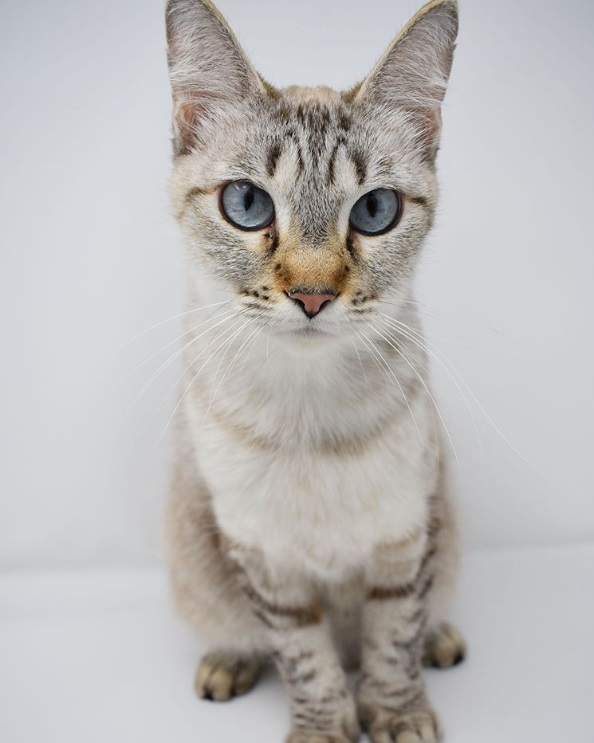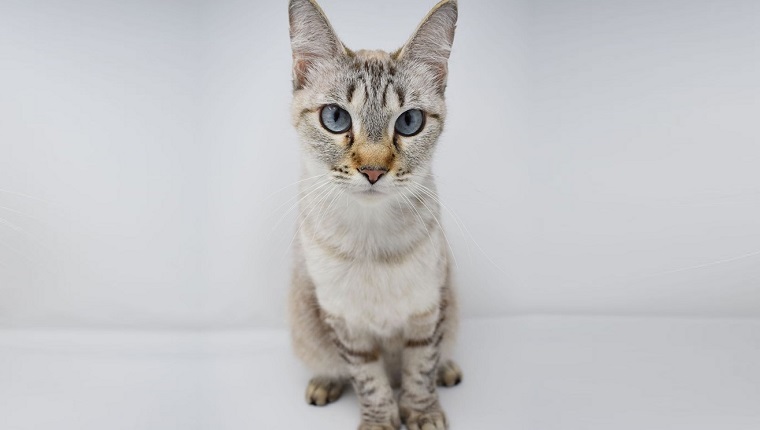The Desert Lynx is a mixed breed cat, resulting from the combination of a number of other breeds including the American Lynx, Maine Coon, Pixie Bob, and possibly even the Bobcat. These felines are known for being outgoing, playful, and social.
Despite their name bringing visions of a wildcat to mind, the Desert Lynx mixed breed is often said to act more like a domesticated dog. This is a feline who’s loyal and likes to be around people, and they’ll likely follow you around the house from room to room. They make for great family pets; although, they do fare better around people rather than being left alone all day.
When considering a Desert Lynx, it’s advisable to prioritize adopting from rescue organizations or shelters to provide a loving home to a cat in need. However, if you decide to purchase, it’s crucial to choose a reputable breeder. Conduct thorough research to ensure that the breeder follows ethical practices and prioritizes the well-being of their cats. Reputable Desert Lynx breeders prioritize the health and temperament of their cats, conduct necessary health screenings, and provide a nurturing environment for the kitties. This active approach ensures that you bring home a healthy and happy kitty while discouraging unethical breeding practices.
Quick Facts
- Origin: United States
- Size: Medium to large
- Breed Group: Mixed breed
- Lifespan: 12-15 years
- Coat: Varies depending on the mix of breeds, but typically short, dense, and spotted or marbled
- Temperament: Intelligent, playful, and affectionate
- Exercise Needs: Moderate to high
- Training: Easy to train
- Grooming: Weekly brushing
- Health: Generally healthy
- The Desert Lynx was bred to look like a bobcat. They are “wild but mild.”
- The Desert Lynx crossed with the Jungle Curl is called the Highlander cat.
- It is rare for the Desert Lynx to have a full tail, but the length will depend on whether or not it has more genes from a Maine Coon or bobcat.
Desert Lynx Pictures

-
Affectionate with Family
Some cat breeds are typically independent and aloof, even if they’ve been raised by the same person since kittenhood; others bond closely to one person and are indifferent to everyone else; and some shower the whole family with affection. Breed isn’t the only factor that goes into affection levels; cats who were raised inside a home with people around feel more comfortable with humans and bond more easily.

See Cats Less Affectionate with Family -
Amount of Shedding
If you’re going to share your home with a cat, you’ll need to deal with some level of cat hair on your clothes and in your house. However, shedding does vary among the breeds. If you’re a neatnik, you’ll need to either pick a low-shedding breed or relax your standards. This furniture cover can make it easier to clean up cat hair and keep it off your sofa!
-
General Health
Due to poor breeding practices, some breeds are prone to certain genetic health problems. This doesn’t mean that every cat of that breed will develop those diseases; it just means that they’re at an increased risk. If you’re looking only for purebred cats or kittens, it’s a good idea to find out which genetic illnesses are common to the breed you’re interested in.
-
Potential for Playfulness
Some cats are perpetual kittens—full of energy and mischief—while others are more serious and sedate. Although a playful kitten sounds endearing, consider how many games of chase the mouse-toy you want to play each day, and whether you have kids or other animals who can stand in as playmates. A classic wand cat toy like this one is perfect for playful felines!
-
Tendency to Vocalize
Some breeds sound off more often than others with meows, yowls, and chattering. When choosing a breed, think about how the cat vocalizes and how often. If constant “conversation” drives you crazy, consider a kitty less likely to chat.
-
Kid-Friendly
Being tolerant of children, sturdy enough to handle the heavy-handed pets and hugs they can dish out, and having a nonchalant attitude toward running, screaming youngsters are all traits that make a kid-friendly cat. Our ratings are generalizations, and they’re not a guarantee of how any breed or individual cat will behave; cats from any breed can be good with children based on their past experiences and personality.
-
Friendly Toward Strangers
Stranger-friendly cats will greet guests with a curious glance or a playful approach; others are shy or indifferent, perhaps even hiding under furniture or skedaddling to another room. However, no matter what the breed, a cat who was exposed to lots of different types, ages, sizes, and shapes of people as a kitten will respond better to strangers as an adult.
-
Easy to Groom
Some breeds require very little in the way of grooming; others require regular brushing to stay clean and healthy. Consider whether you have the time and patience for a cat who needs daily brushing. You should definitely pick up this awesome de-shedding tool for cats of any hair length!
-
Intelligence
Some cat breeds are reputed to be smarter than others. But all cats, if deprived the mental stimulation they need, will make their own busy work. Interactive cat toys are a good way to give a cat a brain workout and keep them out of mischief. This scratcher cat toy can keep your smart kitty busy even when you’re not home!
-
Pet Friendly
Friendliness toward other household animals and friendliness toward humans are two completely different things. Some cats are more likely than others to be accepting of other pets in the home.
Desert Lynx History
According to most accounts of the Desert Lynx’s history, the origin of this fine feline possibly goes directly back to the bobcat. In a bid to breed a cat that combined the dashing wildcat look of the bobcat with tamer, more domestic sensibilities, a number of other feline breeds were mixed to create the Desert Lynx.
The Desert Lynx is recognized by The International Progressive Cat Breeders Alliance (IPCBA) for official registration. These days, you may find the Desert Lynx in shelters or in the care of rescue groups. So make sure to consider adoption if you decide that this is the mixed breed for you!
Desert Lynx Size
The Desert Lynx is a medium-sized cat. As is always the case, exact size standards might vary.
Most Desert Lynx cats weigh between eight and 16 pounds, with the females often being smaller than the males. However, many cats may be smaller or larger than average for their breed.
Desert Lynx Personality
If you’ve been considering adopting a Desert Lynx, you might be wondering exactly what sort of cat you’re going to be living with. First of all, despite the feline’s action-packed name, the Desert Lynx is considered to be a totally domesticated cat. In fact, the mixed breed has picked up a reputation for being more like a dog than a cat at times! So expect your Desert Lynx to act like a faithful companion who will like to follow you around and be by your side, whether you’re relaxing on the couch with a good book or pottering around the kitchen preparing dinner.
This is a very social cat who forms long-lasting bonds with the loving humans in their life. The Desert Lynx has a strong playful side, so you’ll need to be able to commit to regular play sessions and also provide a living environment that gives the cat the option to roam around and explore.
Desert Lynx Health
The Desert Lynx is generally considered to be a healthy cat; although, it’s always important to schedule regular wellness visits with your cat’s vet. There aren’t any breed specific health problems associated with the Desert Lynx, but always keep an eye out for signs that your cat might be in distress or pain.
Desert Lynx Care
As with all cats, it’s important to keep up your Desert Lynx’s regular veterinary checkups to detect any health concerns early. Your vet can help you develop a care routine that will keep your cat healthy.
Beyond scheduling yearly wellness visits with your vet, make sure that you pick up a scratching post for your Desert Lynx cat’s living environment. This can help promote healthy scratching and keep the cat’s nails in good condition, which is a vital consideration for any feline.
The Desert Lynx’s ears should be examined regularly for signs of dirt building up or possible infection. Talk to your vet about starting a regular teeth brushing regimen that will suit your Desert Lynx. Your vet can advise you about specific brands and techniques. Finally, the Desert Lynx will appreciate a cat tree to play and interact with, so definitely look into adding one to your home!
Desert Lynx Coat Color And Grooming
The Desert Lynx is usually found sporting a coat whose pattern is either spotted, ticked, or clouded. Common color combinations for the cat include chocolate brown, silver, ebony, and blue.
When it comes to grooming a Desert Lynx, brushing the cat once or twice a week should suffice. This will help keep the feline’s coat in good condition and also ward off the chances of mats forming. Use the grooming time as an opportunity to bond with your kitty pal.
In terms of climate, most Desert Lynx cats are fairly adaptable. Just remember to always make sure that there’s enough shade and fresh water available during the hotter months.
Children And Other Pets
The Desert Lynx is often cited as a great cat for households with kids. Just make sure that early socialization takes place and boundaries are properly set on both sides. Supervise interactions between young children and cats.
When it comes to other household pets, the Desert Lynx can get along with many other domestic animals; although, you should exercise caution if you already have smaller pets. Always make sure to supervise playtime between the new cat and existing pets. Sometimes these relationships are very much dependent on the individual pets’ personalities. Ultimately, early socialization really pays off with this mixed breed. Make sure to reward your Desert Lynx for good behavior when you bring them home to your family!
Desert Lynx Rescue Groups
It may be hard to find a breed specific rescue for Desert Lynx cats because they’re a mixed breed. However, you may want to try shelters and rescues that cater to all types of cats, including Desert Lynx cats, as well as your local shelter. Here are some nonprofit rescues you can try:
More Info For You
If you’re also looking for a dog, check out DogTime’s dog breed page!





